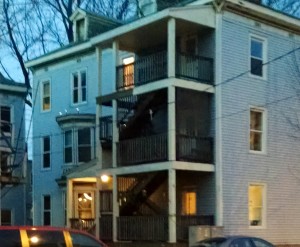On the Portland Housing Crisis

One of the apartment buildings on 61-69 Grant Street where tenants have been evicted.
By Adam Marletta
“On the morning of the first eviction/They carried out the wishes of the landlord and his son,” Fugazi frontman, Ian MacKaye sings on the song, “Cashout.”
“Furniture’s out on the sidewalk/Next to the family/That little piggy went to market/So they’re kicking out everyone.”
With its biting social commentary, the dissonant song — the lead track from the now defunct post-punk pioneers’ 2001 album, The Argument — seems an all-too timely anthem for the unrelenting gentrification and crushing rental costs that are rapidly remaking the city of Portland.
The Portland Press Herald/Maine Sunday Telegram, in an in-depth series on the city’s housing crisis last fall, found that rents in Portland have increased 40 percent in the last five years alone. This trend, combined with stagnant wages and employers’ refusal to pay a living wage, is forcing working class residents out of the city.
(I speak as one of those pushed out of the city. I recently moved back to my hometown of Kennebunk as I can no longer afford to live in Portland.)
In their place sprout high-priced luxury condos, a shifting demographic of retirees from “away,” and telecommuters whose workplaces are not even based in Maine. And don’t get me started on the cruel joke that is “affordable housing.”
The response to the housing crisis thus far by lawmakers and pundits has been all-too predictable: Build more housing, attract more businesses, and the “free-market” will figure out the rest. Also, PPH columnist, Greg Kesich suggests Portlanders simply adjust their “negative” attitude toward growth and be more welcoming to transplants from New York and Boston who consider Portland “cheap.”
Growth is “good for business,” the liberal Kesich wrote in a March 25, 2015 column titled, “Residents of Portland have to get past their aversion to growth.” Portland, he writes, “. . . is a good place to put people and businesses. Although there are quite a few of both now, we could use more.”
Australian philosophy professor and environmental author, Clive Hamilton has a phrase for this myopic — and, he argues, ultimately destructive –obsession with unfettered market capitalism: Growth fetishism.
But the housing crisis reached a crescendo last week when 14 low-income residents were evicted from a 24-unit apartment complex on Grant Street, which the New Jersey-based owner plans on renovating. Many of the building’s tenants suffer from mental disabilities (disability and poverty tend to go hand-in-hand). Most of them receive housing assistance, according to the Press Herald, which broke the story on February 23.
The PPH also revealed the apartment complex was badly neglected by its previous owner with a “history of building and fire code violations, including cockroaches, bed bugs, a lack of fire and carbon monoxide detectors, and faulty fire escapes.” The building was, furthermore, the site of drug-bust, on Jan. 27.
Though the tenants were originally informed they must vacate the building on 61-69 Grant St. by March 1, the landlord, John Le, likely responding to pressure from the newspaper coverage and outraged reaction from neighbors, has given them an extension.
But make no mistake: The tenants are still getting evicted.
The tenant-landlord relationship is not unlike that between employees and employers. In both examples, one group clearly holds more power, authority, and state support than the other. Both are microcosms of the inherent class-struggle capitalism is built on. While landlords are quick to decry state and federal laws that allegedly “favor the tenant,” these complaints overlook the fact that the landlord owns private property. The tenant does not.
(And with home-ownership among millennials at record lows, apartment-dwelling is rapidly becoming the norm for the most-educated but worst-paid generation.)
And just as employers do not — contrary to popular belief — go into business to “create jobs,” landlords have no interest in providing housing –ostensibly a universal human right — to all those who need a place to live. Landlords, like any capitalist, want to make a profit. Housing is merely the commodity they sell.
“As soon as the land of any country has all become private property,” Adam Smith wrote, “the landlords . . . love to reap where they never sowed, and demand a rent even for its natural produce.”
In a press conference the day after the mass eviction, City Council members floated a number of proposals to help make such evictions run more smoothly for “both landlords and tenants,”–even though it is really only the latter group that is adversely affected by them. Councilor Jill Duson, head of the city’s Housing Committee, proposed a Labor Department-style “eviction rapid-response team.” Mayor Ethan Strimling meanwhile, suggested giving landlords “longer wait times” before they can “boot tenants without cause,” as MPBN’s Fred Bever puts it.
Yet none of these “solutions” does anything to halt the problem at hand: Namely, capitalist landlords summarily evicting poor people from their already neglected homes in the middle of winter so they can upgrade them and rent them out for more money.
Then again, we are talking about a city council whose two newest members — Spencer Thibodeau and Strimling — have vocational and fundraising ties to the real estate industry. As such, it is pretty clear whose interests the city is intent on upholding. Tenants, by contrast, have no comparable representation on the council.
“It seems whenever you go to City Council meetings [on housing issues], the voice of developers is very loud,” said Maria Anderson, a member of the Portland Tenants Union.
Portland activists, Grace Damon and Tom MacMillan formed the PTU in the wake of the tragic Noyes Street fire that killed six people on Nov. 1, 2014. The Tenants Union recently called upon the city to establish a full-time “tenant ombudsman” to counter the outsized influence of corporate housing developers like Port Properties and Avesta Housing. The group ultimately hopes to enact rent-control in the city.
But I fear it will take more than lobbying a bought-and-paid-for city government for workers to truly emancipate themselves from the elite gatekeepers to housing, employment, and economic justice. The fact is, homelessness — in Portland and beyond — is not a result of a lack of housing as is commonly asserted. Rather, homelessness exists because there is no financial incentive for landlords or housing corporations to provide shelter for every person that needs it.
As Owen Hill points in a recent article for the International Socialist Organization’s Socialist Worker, “We have to fight not just against what is wrong, but for our own vision of what is right.”
“[A]n organization fighting against gentrification and evictions cannot simply move from attempting to stop one eviction to attempting to stop the next,” Hill writes. “It has to also project a bigger vision of what housing justice looks like.”






4 Comments
Sarah
While your comments are certainly relevant from the renter’s point-of-view, as a house owner in Portland I’d like to point out that the costs of buying have gone up so much that some of us rent just to make the mortgage. And we have to rent high because the mortgage is high.
Portland has become popular. As such we are encountering some of the real problems in housing that accompany that process. Many other cities are experiencing gentrification and price hikes at an alarming rate as well: New York (for a long time now), Boston, Seattle, etc. (Detroit would love to have our problem….they have quite the opposite problem — empty, devalued houses). It comes with costs and benefits and one of those costs is a problem with affordable housing for low income families. That’s a real problem.
New York tried to solve its problem with rent control. That worked for awhile, but not any more. Most cities have low rent housing subsidized by the city. That takes care of “slum landlord” housing as you described in the building from which the tenants were evicted, because it compensates landlords for the loss in rent they encounter so they can afford to maintain the building.
Personally, I think the solution is for every new (or renovated) building to have a % of the dwellings designated low rent and subsidized by the city. What we also don’t want is the ghettoizing of low-rent families into low-rent only buildings. That would be an insult to those families. And some locals may also perceive it as a threat to land values and fight it.
Adam Marletta
Thanks for reading, Sarah. I appreciate your perspective.
What do you think it will take to overthrow capitalism and make housing a basic human right, not dependent upon a profit-motive?
Bob Delaney
You should ask the USSR how that worked out.
Adam Marletta
Well, given that the Soviet Union was a form of state-controlled capitalism, and in no way resembled the traditional socialism I am advocating… I’m not really sure what your point is.
The fact that the previous commenter–herself a landlord who concedes her sole motive in renting is to secure a profit–did not provide an answer to my completely sincere and legitimate question more or less proves the point of my original article.